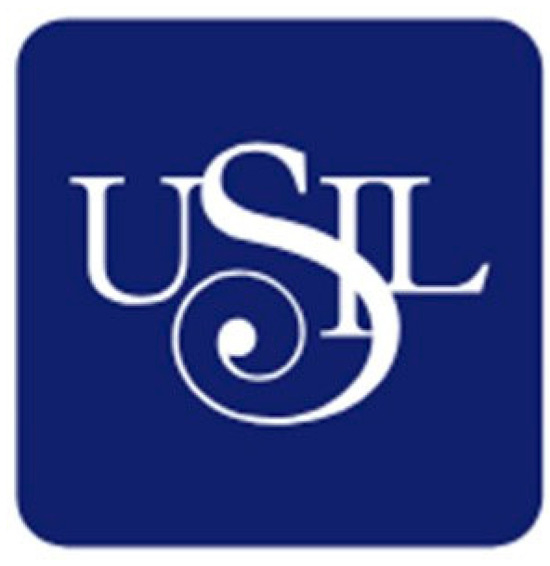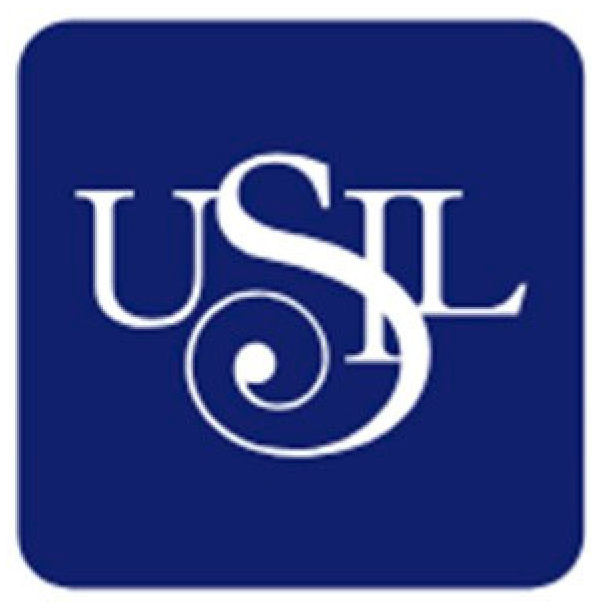1. Introduction
The III International Congress: Technology and Innovation in Engineering and Computing, organized by Faculty of Engineering, St. Ignatius of Loyola University (USIL), Peru (Figure 1), was held on 20–24 November 2023 as an online event. Due to the context in which we find ourselves, today, more than ever, we must think globally about the growth and development of our society. The impact of the practices of Engineering and Computer Science in the field of technology, innovation and sustainability now takes prominence. Participate in this event and discover the solutions that Engineering offers different fields. All information can be found at https://usil.edu.pe/landings/pregrado/citiic-2023.

Figure 1.
Logo of USIL.
2. Conference Theme
2.1. Computer Science/Information Systems
Explore the applications of different areas of knowledge on computer science and information systems in different productive, entertainment and health sectors, with a vision aimed at the creation and development of our own technologies to reduce the consumption of existing ones.
2.2. Robotics, Automation and Additive Manufacturing
National and international industrial experience has revealed important considerations about Industry 4.0 projects. Currently, it is essential to establish a digital strategy that guides us towards a successful implementation of digital transformation in an organization, taking advantage of the opportunities offered by new technologies. This heading analyzes technological progress throughout the stages of automation in the productive sphere, placing emphasis on robotics, automation and additive manufacturing.
2.3. Environment and Sustainability
In this historic milestone for humanity, it is vital to think globally and apply science and technology to achieve the United Nations Sustainable Development Goals. With a focus on responsible economic growth and development, it examines sustainable production and consumption, energy efficiency and the use of renewable energy from industrial byproducts from a circular economy perspective, with emphasis on new efficient technologies that seek to reduce the environmental impact.
2.4. Physical and Building Systems
A country's ability to meet the needs of its population depends on its infrastructure in key areas such as health, education, transportation, production and communication. It is not only about the number of hospitals, schools or kilometers of roads, but also about the quality, efficiency and evaluation of vulnerability and seismic risk. Therefore, it is necessary to explore new materials, techniques and technologies in engineering and computing that allow more efficient execution and maintenance of this infrastructure, which in turn guarantees better care for society.
2.5. FoodAgrotech
It aims to explore the development of new technologies and their impact on the agriculture and food chain, with a focus on their sustainable implementation. In addition, it investigates various applications such as machine learning, big data, robotics, artificial intelligence, internet of things, biotechnology, biopolymers, non-thermal technologies, blockchain, genomics and nutrigenomics, bioinformatics, precision agriculture, metaverse, among others.
3. Committees and Speakers
3.1. Committees
- Prof. Dr. Luis Olivera-Montenegro (President)
Introduction: Food engineering; innovation; cereal science and food biotechnology.
Affiliation: Bioprocesses and Biomass Conversion Research Group, San Ignacio de Loyola University, Peru.
- Prof. Dr. Nain Máximo Ramos Alvarez
Introduction: Mechatronic engineering; cereal science and food biotechnology.
Affiliation: Universidad San Ignacio de Loyola, Peru.
- MSc. Pedro Shiguihara
Introduction: Artificial intelligence; data science; data analysis; probabilistic graphical models.
Affiliation: Universidad San Ignacio de Loyola, Peru
- Prof. PhD. Luis Santillan
Introduction: Applied ecology.
Affiliation: Environment and Sustainability Research Group, Universidad San Ignacio de Loyola, Peru.
- Prof. MsC. Juan Salazar Campos
Introduction: Director of the Information Systems Engineering career. San Ignatius of Loyola University. Systems and Computer Engineering from the Universidad Nacional Mayor de San Marcos (UNMSM). Master’s in computer science in the specialty of Computer Science from the Pontifical Catholic University of Peru (PUCP).
Affiliation: Universidad San Ignacio de Loyola, Peru.
- MsC. Jose Fortunato Oliden Martinez
Introduction: School director Private University Norbert Winer S.A. Associate professor at the National University of Engineering. PhD student in Mechatronics Engineering. Master and Mechatronic Engineer from the National University of Engineering.
Affiliation: Universidad Nacional de Ingeniería (UNI), Peru.
- Prof. MsC. Luz Adanaqué Infante
Introduction: Information systems; software engineering and data science.
Affiliation: San Ignacio de Loyola University, Peru.
- Prof. PhD. Karen Vanessa Munive Nuñez
Introduction: Doctor in Food Sciences from the University of Campinas, Brazil, bachelor’s in biology from the San Luis Gonzaga University, Ica, Peru.
Affiliation: San Ignacio de Loyola University, Peru.
- Prof. PhD. Giovani Leone Zabot
Introduction: Food processing; extraction; supercritical fluids; hydrolysis; emulsions.
Affiliation: Laboratory of Agroindustrial Process Engineering (LAPE), Federal University of Santa Maria (UFSM), Brazil.
- Prof. PhD. Marko Antonio Lopez Bendezu
Introduction: Director of the Civil Engineering program at the San Ignacio de Loyola University. Doctor in Civil Engineering with Specialization in Geotechnical Engineering from the Pontifical Catholic University of Rio de Janeiro.
Affiliation: San Ignacio de Loyola University, Peru.
- Prof. PhD. Esteban Herrera
Introduction: Food engineering; emerging technologies.
Affiliation: Bioprocesses and Biomass Conversion Research Group, San Ignacio de Loyola University, Peru.
- Prof. PhD. Eber Huanca Cayo
Introduction: Dean of the Faculty of Engineering and Computing at the Universidad Catolica San Pablo. Master and Doctorate in Mechatronic Systems from the University of Brasilia.
Affiliation: Universidad Catolica San Pablo, Peru.
- Prof. PhD. Gilberto Reynoso Meza
Introduction: Doctorate in Automation from the Polytechnic University of Valencia. He is currently in the Graduate Program in Industrial and Systems Engineering (PPGEPS) at the Pontifical Catholic University of Paraná (PUCPR), Brazil as an Associate Professor.
Affiliation: Pontifical Catholic University of Paraná (PUCPR), Brazil.
3.2. Speakers
- MsC. Jeffri Murrugarra, Brazil
MSc. from the Federal University of Rio Grande do Sul. BSc. by the National University of Trujillo. Student exchange at the University of São Paulo. Experience in Computer Vision and Natural Language Processing, with articles accepted in EMNLP and CVPRW. Currently affiliated with Federal University of Rio Grande do Sul, Brazil.
- PhD. Roxana Yesenia Pastrana Alta, Peru
Introduction: PhD at the University of São Paulo -São Paulo, Brazil (2016). Graduate in Chemistry (2010) from the National Engineering and Collegiate University (2010). Specialist in Quality Management Systems from the National University of Engineering (2010). Specialist in Bioinorganic Chemistry and Ecotoxicology driven by Technology. Founder of the BIOMET research group.
- MsC. Liza Melina Meza Flores, Peru
Master in rural development. His current research topics are sustainable consumption and production (SDG 12) for sustainable cities and communities (SDG 11). With 15 years of experience working with different tools, such as LogFrame, ToC, Value Chain Analysis, Institutional Analysis and Community Capitals for sustainable ecosystems, Nature-Based Solutions and rural-urban links.
- PhD. Arturo Mariño Echeregaray, Peru
PhD degree from Environmental Design Faculty of University of Calgary, and his MBA degree from Haskayne School of Business of University of Calgary. He also completed his master studies in MSc. Sustainable Energy Development in the University of Calgary and he was graduated from CENTRUM Graduate School of Business from Pontificia Universidad Catolica del Peru.
- Ph.D Miguel Angel Saldaña Serrano, Brazil
Biologist with a major in hydrobiology graduated from the Universidad Nacional Mayor de San Marcos (Peru). Master and Doctor in Aquaculture from the Federal University of Santa Catarina (UFSC-Brazil). With more than 15 years of technical and professional experience in the areas of aquaculture and aquatic ecotoxicology. Postdoctoral researcher in the Postgraduate Program in Aquaculture (PPGAQI-UFSC). Currently, it is part of the Aquatic Pollution and Immunochemistry Biomarkers Laboratory (LABCAI).
- MgC María del Rosario Uría Toro, Peru
Director of Standardization of the Peruvian Standardization Organization. Representative of Peru before international organizations such as the International Organization for Standardization-ISO and the International Electrotechnical Commission-IEC.
- MsC. Cuellar Cordova Francisco Fabian, Peru
Director of the master’s degree in Control and Automation Engineering, director of the Center for Advanced Manufacturing Technologies (CETAM, 2015 - 2018). Associate Professor of the School of Engineering of the Pontifical Catholic University of Peru (PUCP). Founder of the Technological Innovation Group (GIT) at PUCP. Co-founder of the startups TUMI ROBOTICS and QAIRA. He obtained a Bachelor of Science degree in Electronics from PUCP, a master’s degree in Mechatronics from Kings College University of London, and a Master's degree in Innovation and Technology Management and Policy from PUCP.
- PhD. Pablo Daniel Bonaveri, Colombia
Doctor in Mechatronic Engineering; Master of Science; Specialist in Sensors, MPS and Robotics; Mechanical Engineer. Director of Research and Transfer-Autonomous University of the Caribbean
- PhD. Carlos Diaz Saenz, Colombia
Doctorate in Project Management. Master in Mechatronic Engineering. Master in Micro Mechatronic Systems and Nanotechnology. Master’s in business administration MBA. Electronic Engineer and Higher Industrial Technical Engineer
- MsC. David Tinoco Reyes, Peru
Professional in information systems, Data & Analytics Practice Lead. Master’s in business management from the ESAN Business School (Peru), Master in Information Technology Management from La Salle (Spain) and Master in Big Data & Business Analytics from ESIC (Spain).
- PhD. Javier Saul Córdova Ramos, Peru
Food engineer, with emphasis on research work related to food science, design and formulation of various nutritious foods of animal and plant origin. I develop research projects - food technology under a mixed food approach -. Professor at USIL Agroindustrial Engineering
- MsC. Alejandro Marzano Barreda, Peru
Engineer in Food Agroindustry from the Zamorano University (Honduras) with a master’s degree in food science in biodegradable packaging approach at the State University of Londrina (UEL), with a course in Reverse Engineering of Processed Foods from the State University of Campinas (UNICAMP)
- PhD. Guillermo Antonio Baigorria Paz, Peru
Doctor in Ecological Production and Resource Conservation, with specialization in Soil Science. He has been Executive President of the National Meteorology and Hydrology Service (SENAMHI) and is currently General Manager of Next Season Systems LLC, where he works on artificial intelligence for agricultural management.
- PhD. Consuelo Cecilia romero Leon de Baigorria, Peru
Master in Soils from the National Agrarian University La Molina and a Ph.D. in Ecological Production and Resource Conservation from Wageningen University. Her specialization in erosion and water conservation, together with her experience in soil science and irrigation, has led her to research in the United States and Peru, in addition to training in Holland and Japan. Consuelo has founded a startup in digital agriculture, where she helps farmers optimize fertilization and water management through monitoring parameters in the field.
- PhD. Javier Moran Rey, Spain
Doctor in Medicine and Surgery and is currently Director of Research, Development and Innovation of the University Institute of Food Innovation of the UCAM. With an outstanding career in the academic and health fields, he has dedicated his career to research and the training of new generations of professionals. He is a Director at San Antonio Biotics SL and Sole Partner and Sole Administrator at Food Consulting Health SL.
- MsC. Jose Fortunato Oliden Martinez, Peru
PhD student in Mechatronics Engineering. Master and Mechatronic Engineer from the National University of Engineering. General Manager of Engineering Mechatronics SAC and promoter of START UP and INCUBA-UNI Technology Base companies. Promoter and consultant of the first FABLAB in Latin America.
- PhD. Martina Hulanová, Czech Republic
Civil engineer for San Ignacio de Loyola University. Doctor of Philosophy from Pontifical Catholic University of Peru. Currently working as Team EXACT Product Manager.
- MsC. Jheyder Pérez, Peru
MSc(c) Natural Risk Management PUCP. Founder and CEO of Toward Resilience Co. Structural Assessment Specialist and Risk Evaluator. Community Resilience Research. PUCP Pre-Teaching.
Conflicts of Interest
The author declares no conflicts of interest.
Disclaimer/Publisher’s Note: The statements, opinions and data contained in all publications are solely those of the individual author(s) and contributor(s) and not of MDPI and/or the editor(s). MDPI and/or the editor(s) disclaim responsibility for any injury to people or property resulting from any ideas, methods, instructions or products referred to in the content. |
© 2025 by the author. Licensee MDPI, Basel, Switzerland. This article is an open access article distributed under the terms and conditions of the Creative Commons Attribution (CC BY) license (https://creativecommons.org/licenses/by/4.0/).

